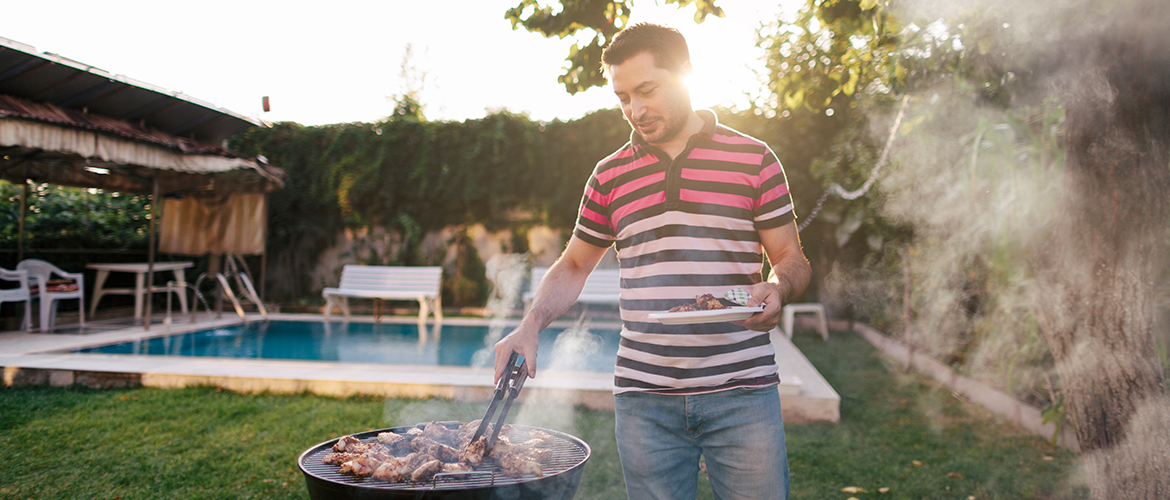June 24, 2019
Why Are Days Longer in the Summer?
The extended daylight during the summer months is due to daylight saving time, which begins in the spring and ends in the fall. When you "spring forward" for daylight saving time, you push the clocks forward one hour – allowing for that extra hour of beloved sunlight. Daylight saving begins on the second Sunday in March and goes until the first Sunday in November when the clocks are pushed back an hour.
This was originally done in an effort to conserve energy.1 Think about it: the more daylight, the less people would need to use electricity. It was also useful for farmers or outdoor workers since they could fit in more work before it got dark.
Over the years, people have not only enjoyed the energy conservation and extra work hours, but they have also enjoyed having longer days during the summer months to spend outside in the sunshine doing the things they love.
The combination of having longer days and (hopefully) more sun during the summer months contributes to getting more vitamin D, which has positive health impacts. For example, did you know that vitamin D has been shown to keep bones strong and healthy?2 There have also been studies that suggest vitamin D can boost the immune system and protect against illnesses like the flu and respiratory infections.
Vitamin D is produced when you are exposed to UV rays, so spending more time outside, specifically between 10 a.m. and 3 p.m. when the sun is the strongest can aid in producing more vitamin D. While spending time outside is the best way to get vitamin D, it is also important to protect your skin from burning.
Additionally, taking in more sunlight also leads to an increase in serotonin levels. Serotonin is a chemical in the brain that has been shown to be directly linked to mood. The more time spent outside in the sun, the higher serotonin levels – say bye, bye to bad moods!4
MedExpress Pro Tip: If you are feeling down or anxious, spend some time outside! Spending more time outside not only promotes physical health, but can help with your mental health as well. In fact, a 2015 study done by Stanford University found that spending more time in nature can reduce anxiety and promote positivity.5
Given all of the health benefits associated with spending more time outdoors, make the most of long summer days and get outside with these five activities.
7 Things To Do With Longer Days
1. Put The TV Binging On Hold

Netflix will always be there, so put your binging on hold for the summer and spend that time outside enjoying the longer days. Not only does marathon-watching keep you inside, but the blue light from staring at a television or computer screen can also have a negative effect on your sleep.6 While catching up on your favorite shows may be entertaining, binge watching can also lead to stress and anxiety.7 Instead of catching up on your shows before bed, be present in the moment and go outside to take in the sunset. This can provide some relaxation before snoozing.
2. Go For A Walk
What better way to enjoy the longer spring and summer days than to spend more time outside! Take advantage of the extra time and go for an evening walk or run to unwind after a long day. You can even take this time to explore a local trail or park you've never been to before.
3. Join A Sports League
Another advantage to the spring and summer months is the different activities available in the evenings. Whether it's a game of pick-up basketball outside with friends or an organized sports program, take advantage of the extra daylight and get moving. Many cities even offer adult sports leagues where you can sign up with a group or join an existing group to play a variety of sports. This is a great opportunity to meet new people or catch up with old friends while also staying active and getting some extra vitamin D.
4. Eat Your Meal Outside
Instead of eating your dinner inside, bring it outside and enjoy the sunlight. This can apply to breakfast as well since the sun starts to rise earlier in the later summer months. Don’t have an outdoor seating area? Pack up your meal and bring it to a local park where you can sit and enjoy the weather. You can also take advantage of outdoor seating that often opens up at restaurants during the summer months.
5. Fire Up The Grill

One of the first things that comes to mind when thinking of summer is grilling out. Rather than using your oven or stove to cook dinner, take it outside and throw it on the grill. Hamburgers and hotdogs may be your grilling go-to, but the possibilities are endless. Chicken, steak, and fish can all be cooked on the grill, in addition to many vegetables, offering a simple and healthy meal that can be enjoyed under the sun.
6. Grow A Garden
Spring and summer are the peak months for growing most plants. Take advantage of longer days by growing and tending to your own garden. Not only is this a great way to pass some time outside, but you also get to reap the benefits of growing your own produce and herbs. Growing your own produce can save you money in the long run and can avoid those pesky chemicals that are always sneaking into our foods since you are growing them yourself. Don’t have a yard? You can grow herbs and some vegetables, such as tomatoes and peppers, in potted plants as long as they get sunlight.
7. Meet Up With Friends

Take advantage of the extra time and warm weather in the summer months and reconnect with friends. The warm weather and long days open up so many more activities that you can do together. Of course, you can always meet for happy hour or coffee, but you can also consider going for a hike or bike ride, or exploring a park you have never been to before. The possibilities are endless!
References:
1 National Geographic: Why Do We Have Daylight Saving Time?. Last updated November 2, 2018. Accessed April 19, 2019.
2 Cleveland Clinic: Vitamin D & Vitamin D Deficiency. Last updated October 2015. Accessed April 30, 2019.
3 Healthline: How to Safely get Vitamin D from Sunlight. Last updated April 28, 2018. Accessed May 20, 2019.
4 Landscape and Urban Planning, Volume 138: The Benefits of Nature Experience: Improved Affect and Cognition. Last updated June 2015. Accessed April 22, 2019.
5 Stanford Woods Institute for the Environment: Stanford Researchers Find Mental Health Prescription: Nature. Last updated June 30, 2015. Accessed May 20, 2019.
6 Harvard Health Publishing: Blue Light Has a Dark Side. Last updated August 13, 2018. Accessed May 20, 2019.
7 American Public Health Association: TV Can be a Health Hazard. Last updated November 3, 2015. Accessed May 21, 2019.
